Lesson Reminder 2-3: Financial Excess
“Only a fool would aim for survival without excess.” – the Wealthy Gardener
OTHER RECENT VIDEOS
. . . . . .
SEE THIS MESSAGE ON THE BLOG
Life Lessons on Prosperity
By John Soforic on
Lesson Reminder 2-3: Financial Excess
“Only a fool would aim for survival without excess.” – the Wealthy Gardener
. . . . . .
SEE THIS MESSAGE ON THE BLOG
By John Soforic on
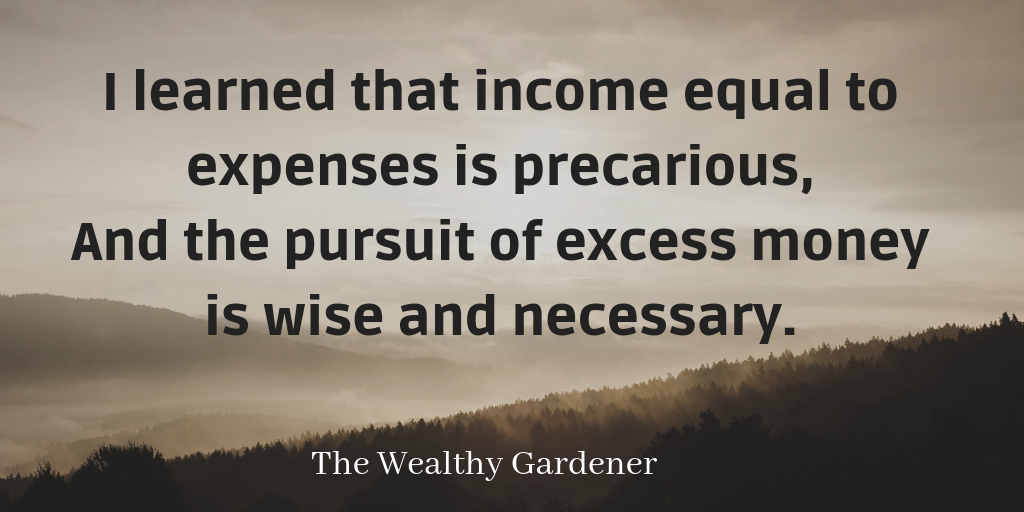
“Only a fool would aim for survival.” -the Wealthy Gardener

LESSON 2-3 REMINDER
Money won’t make us happy, they say. But in my twenties, I learned what it was like to be on a revolving treadmill with no financial direction.
Three years into my career, I was only making ends meet. I worked six days a week, but had no savings. And I felt defeated by an empty bank account. I then realized that an income without more than enough is not nearly enough.
Without a surplus beyond my living expenses, I would never be able to take my family on vacations. I would have to say “no” to helping my kids throughout their lives. I would be forced to decline assistance to my aging parents in their later years. I knew that thoughts of work would always nag me while I spent time with family and friends. And, most important, I would leave myself, and those who count on me, vulnerable to the slightest economic setback.
On the other hand, I considered, having excess money would transform my family life. My wife and I could relax together. Our minds would be free to think and read in leisure. We could pursue nobler causes with more meaning. We could take dream vacations to enrich our lives. We could pursue our interests. We would never be a monetary burden to our kids. Our hopes would be greater, and our options would be exciting.
Money may not buy happiness, but it does pay for options. Without chasing o dollar, you can choose to give your to important tasks. You can choose your contribution, your service to others, your mission, and your life purpose.
And these things lead to fulfillment and happiness. Never let others dictate your life. Wealth allows our full potential. With more than enough, you can experience this one life on your own terms.
. . .

By John Soforic on
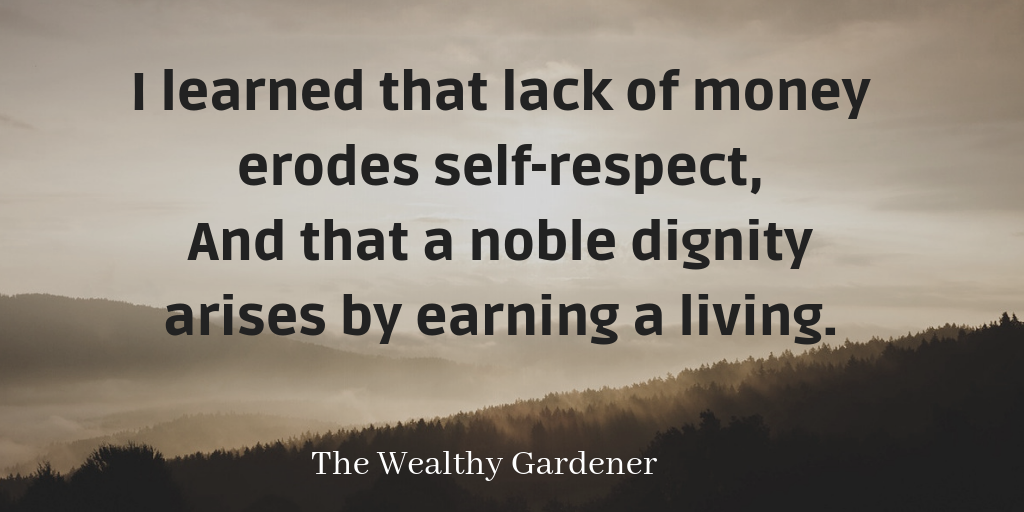
“The cooperative energy is all around us.” – the Wealthy Gardener

LESSON 2-2 REMINDER: FINANCIAL SECURITY
The garden has forever been a metaphor for a person’s time on Earth. We can shape our environment, by our own free will, if we’re willing to sacrifice. Gardeners work hard, but they know they’re not alone.
And in your own life, you are not alone either.
Unless you choose to be alone.
While effort in life is critical in every garden, it’s not everything. We too often fail to notice the honeybee as it pollinates, the emerging flower that attracts the bee, the seed falling on fertile soil, or the rain that activates the fallen seed. We fail to witness the coordination of Nature that constantly unfolds all around us. We fail to experience the wonders of the garden.
Why is this relevant to you in real life?
It’s a reminder to pause, breathe deeply, and be mindful.
If you pause to be mindful in your days, you’ll see the cooperative energy all around you, or at least you’ll see the effects of it. You won’t see inspiration, but you’ll get ideas. You won’t see inner wisdom, but you will sense when something feels right, and when it feels wrong. You won’t see guidance, but you’ll often be compelled by deeper instincts. And you’ll begin to notice that coincidences show up.
With goals and faith, these powers of the garden serve you.
At the age of twenty-five, I didn’t know if I’d even survive. But then I learned that financial security was a conviction, a certainty of results, a Power Within that commands an effect.
I was financially secure the day I learned to focus my thoughts on what I wanted most, and then experience these outcomes with an absurd faith. If you do the same, your life will get easier. And you will not walk alone.
. . .

By John Soforic on
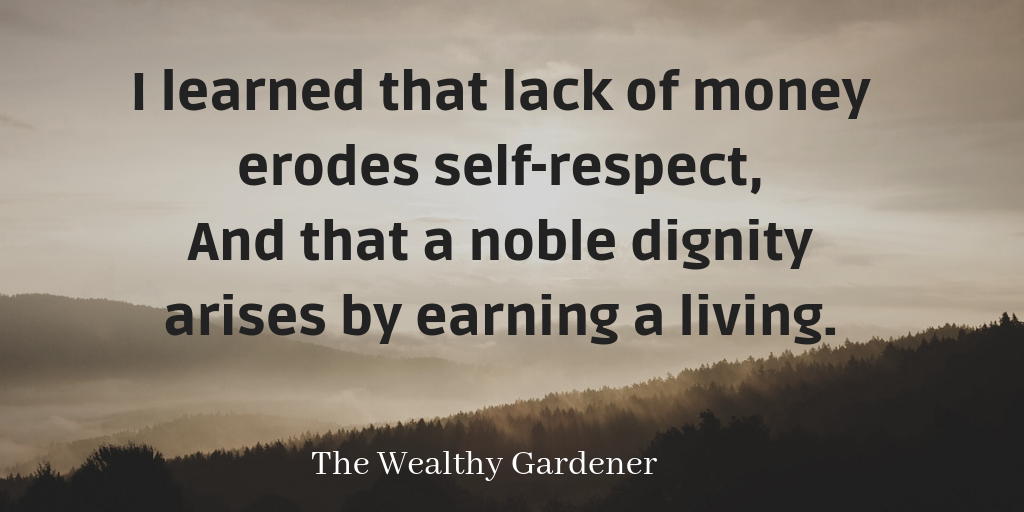
“There is no work without dignity.” – the Wealthy Gardener

Lesson 2-1 Reminder: Dignity
You are a worker. You perform tasks whether you like them or not. You do what you must do, whether you want to or not. And you don’t complain.
As we mature into independent adults, we discover the dignity of work to provide for our living expenses. We won’t love every aspect of our job, but any work beats the humiliation of being broke and dependent.
Work is a friend, not a lover; it is a sober, steady relationship. It feeds you and your family. You can trust in work when all else seems lost. You can trust work to pay the bills. You can trust extra work to earn your future wealth.
“Work is my best friend,” wrote George Clason. “It is the only friend who gives me the things I want.” Theodore Roosevelt advised, “Do what you can, with what you have, where you are.” In our duty, we find our dignity.
Of course, not all work is equal. Not every job is fun. But there is no work without dignity, and we’re happier and more fulfilled with direction and purpose.
Do the best where you are with one eye on the future.
It is not the dirty gardeners who deserve our pity, but rather the clean ones, sitting on the porches, waiting for the perfect job, while their gardens grow into disarray. Work is only engaging our passing hours with purpose.
. . .

By John Soforic on
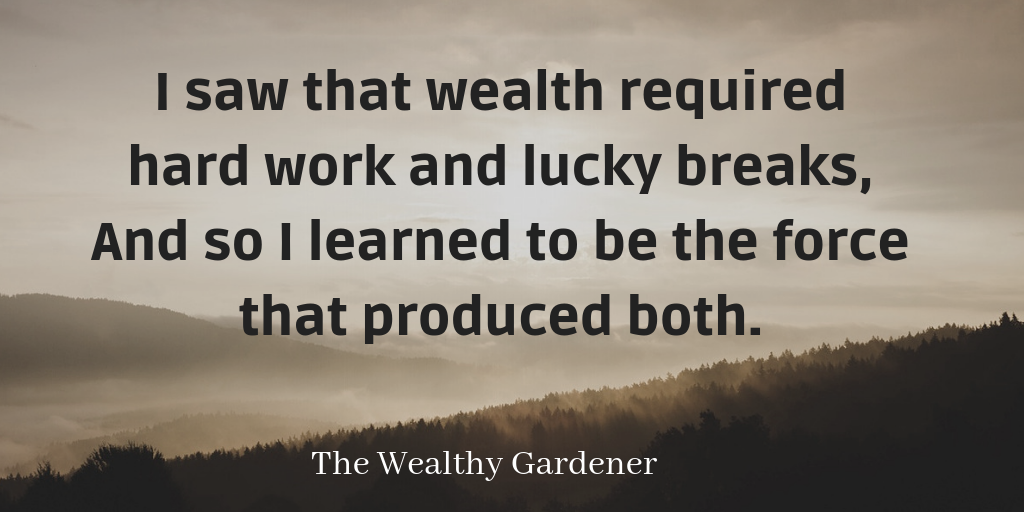
“Some people have more impact than others.” – the Wealthy Gardener

LESSON REMINDER 1-4: IMPACT HOURS
The Wealthy Gardener book, in the first year after being self-published, has sold over 45,000 copies. It’s been translated into three foreign languages. It’s been taken over by Penguin. And the audio was good enough that the original version will not undergo a single change.
One of the harshest online reviewers, however, was disappointed to learn that there is nothing special about the author: he’s just a regular guy.
Little does he know that he made the case for the book!
How does an ordinary person, like the author, gain an uncommon result of financial freedom at 50? And while being a family man?
It’s about goals, for sure. It’s about intentional living. But, when the rubber meets the road, it’s about filling up the hours of days with impact.
An impact hour is sixty minutes of doing the right things that lead to a critical outcome. It’s an hour of direction. An impact hour is the opposite of a hollow hour, and it moves us forward toward goals. It is an hour of effort that adds to the great volume of work that is required for achievement.
We can get a lot of things wrong in life––and still be okay––but we cannot get this one thing wrong. The impact of a lifetime reflects the impact of its hours.
We too often fail to observe that success—as defined by the actualization of a thing we desire and intend—is not the result of extraordinary people. It is the result of consistent effort. Success comes to those who just do the gritty work.
It takes time to be a success, but time is mostly what it takes.
. . .

By John Soforic on
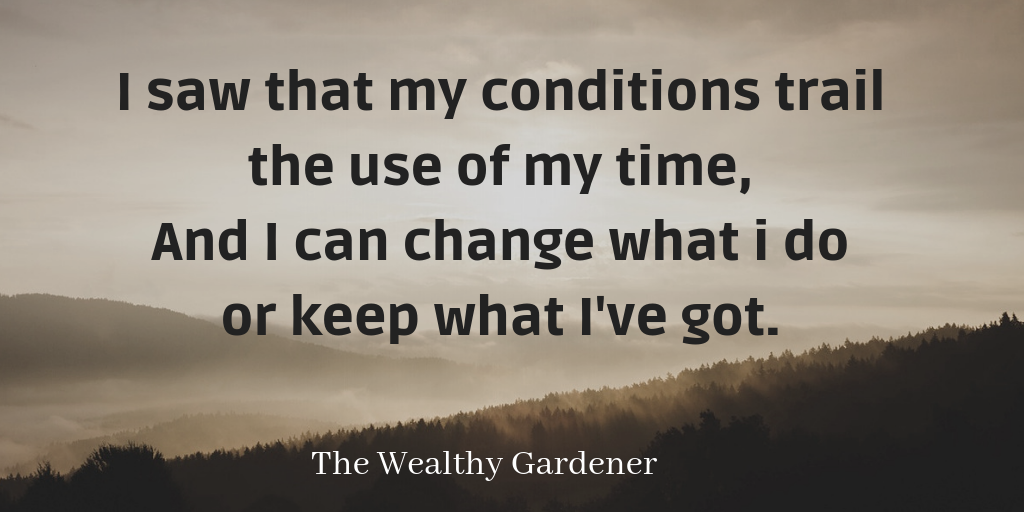
“We need impact in our passing hours.” – the Wealthy Gardener

LESSON 1-2 REMINDER: THIS ONE DAY
We can get a lot of things wrong in life and still be okay, but we cannot get this one thing wrong: The impact of life reflects the impact of its hours.
I met with the Dean of my college after my freshman year. My grades were atrocious. This nice older man tried to gently persuade me to consider a less challenging career. He didn’t realize I was crazy over a girl, that I had a host of fun buddies, and that I played gin rummy until two o’clock every night.
He couldn’t fathom that a young person would squander a college education in favor of a social agenda that left no room for academic study.
The Dean thought I was incapable due to a lack of intelligence, when, in fact, I was powerless due to a lack of purpose.
When I wasted my time, I wasted my potential. I left the meeting, set goals for next year, made a study plan, worked my plan and earned straight As.
And as adults, the lesson of sowing and reaping applies more than ever in this modern age. Too many busy people are victims of unrewarded hustle.
We need to slow down, control our attention, set goals, plan our weekly hours, work the plan, and earn our dreams. It’s all about the schedule.
In an age of distraction, we need to be more present than ever. We need to use the days. We need to put more impact in the passing hours.
Our potential is our duty, and it is expressed in the passing hour. Be still and concentrate on the things you want. If you can’t narrow your focus, you’ll forever dissipate your potential during the crowded days of an ordinary life.
. . .
